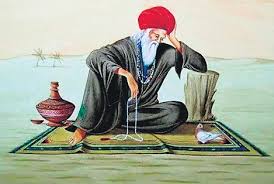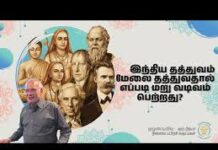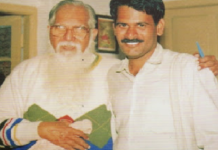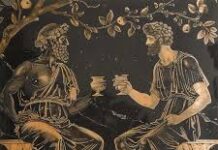
Dear Je
I heard about the class on Islamic tradition. Since you have chosen it, there is no doubt that the teacher must be qualified. I am considering participating in the session happening in July. But before that, I have a question. Where does the Islamic-Sufi tradition fit into this curriculum, and why should it be studied?
(If I am attracted to it and convert to Islam, would you support it? – This is my friend’s question)
Bhaskar
Dear Bhaskar,
Nisha Mansoor, who teaches about the Islamic-Sufi tradition, has been continuously involved in the field for thirty years. Today, he is a highly qualified expert in teaching it.
*
Many people might have seen a photograph at the Fernhill Gurukula of Nitya Chaitanya Yati. It is a picture of Nitya engaged in an Islamic prayer. This photograph was taken when Nitya was praying with the Sufi mystic known as Oachira Uppa.
Among Indian mystics, from Kabir and Guru Nanak to Ramakrishna Paramahamsa, Narayana Guru, and Shirdi Sai Baba, many have practiced Islamic prayers and fasting. They were closely associated with Islamic mysticism. Among Nitya’s direct disciples, Ustad Shaukat is recognized today as a Sufi scholar.
The Indian philosophical tradition sought to see the faces of truth everywhere and attempted to integrate all philosophical elements. Therefore, it was deeply influenced by Islam. It is impossible to fully understand Hindu philosophy after the tenth century without considering the impact of Islam.
The relationship between Islam and Hindu philosophy can be summarized in two ways. First, the influence of Islamic monotheistic doctrine. Second, the influence of the Islamic Sufi tradition.
Islam presents oneness as an absolute truth: the oneness of God and the unity of His worshippers. This concept has influenced Indian philosophical traditions in various ways, as many scholars have pointed out. Historians indicate that this dialogue and synthesis began during the era of Emperor Akbar.
Alongside philosophical dialogues, cultural exchanges also took place, particularly in music. Researchers suggest that the tradition of bhajans in India has its roots in the Islamic (Persian) musical tradition.
Though Sufi Islam originated in Arabia and later in Persia, the Indian Sufi tradition has a unique identity specific to India. The chief figure of this tradition can be said to be Khwaja Moinuddin Chishti, who is enshrined in Ajmer. The Indian Sufi tradition generally emphasizes a transcendental and inner spiritual experience beyond religion. Sufi mystics were and are worshiped beyond the confines of religious boundaries.
The Indian Sufi tradition has played a pivotal role in Indian literature and music for many centuries. The literary works composed by Sufi mystics throughout India are treasures of Indian languages. Often, they adopted poetic forms from Indian folk traditions.
Indian literature entered a period of stagnation after the 14th century. Great literary works had already been created in all languages. Subsequently, minor imitative and derivative works emerged. Literature had become a display of erudition. It was produced in the courts of kings and nobles.
The Sufi literary works broke this central rigidity from the margins. They transformed folk song forms into poetry and discussed profound philosophies and mysticism. The language style was often rooted in folk traditions. This breakthrough paved the way for various new forms of literature to emerge thereafter.
In Indian music, the contribution of Sufi music is extremely significant. The ‘Alapana’ method, which focuses on the underlying structure of Indian music, and the concept of fusion in music are gifts from the Sufi musical tradition. The Sufi tradition brought Arabian, African, and Persian music here. These blended with the layers of Indian tradition to create numerous new ragas. Both Hindustani and Carnatic music developed in this way.
Additionally, it must be mentioned that there is a distinct Islamic tradition unique to Tamil, often referred to by scholars as Tamil Islam. The chief figure of this tradition is the Islamic mystic and scholar, Sadakathullah Appa. The great poet in Islamic tradition is Umaru Pulavar. (We are currently in the ongoing effort to fully document Tamil Islam on Tamil Wiki.)
Tamil Islam can be approached in three divisions.
1) The first division consists of Arabic Tamil literature, which involves writing Tamil using the Arabic script. These works were extensively written during the 15th, 16th, and 17th centuries but are gradually disappearing due to a lack of practitioners.
2) The second division includes classical Islamic works, such as Umaru Pulavar’s “Seerapuranam” and “China Seera” by Fani Ahmad Maraikayar.
3) The third division encompasses Islamic folk literature and Sufi literature written in folk forms. Islamic folk literature played a significant role in establishing the “Kanni” form. (I have previously written about this in detail.)
Today, why should someone learn about Islamic Sufi tradition? Today, as part of an integrated education, why do we introduce these subjects?
# Indian cultural development and Indian literary tradition should be studied in order to know them historically and evolutionarily. Islamic cultural background is necessary even for understanding the non-Islamic literature of India.
# Understanding Tamil Islam is essential to grasp a significant aspect of Tamil culture.
# To truly appreciate Indian music, one must understand Sufi music. Understanding Sufi music involves grasping its profound spiritual essence through the teachings of Sufi masters. Those who comprehend Sufi music, experience it as a form of meditative journey.
# Islam is a philosophical expression. Knowing the truth wherever and however it manifests is necessary for an aspirant seeking enlightenment. All truth-seekers need it for the same reason that our philosophers needed it.
Je
It is welcome in any case for one to know the true message of Islam, feel it acceptable to him, and accept that as his way of religion. Whichever religion one chooses is superior for him/her. Spreading one’s intuition is also a good practice. Propagation, acceptance and rejection of religion for political reasons is definitely inferior in every way.
Jeyamohan
Translated by Geethaa Senthilkumar












